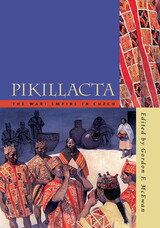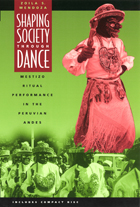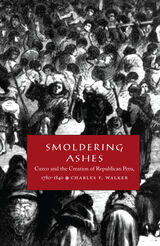3 books about Cuzco (Department)

Pikillacta
The Wari Empire in Cuzco
McEwan, Gordon F.
University of Iowa Press, 2005
The origin of the first Andean imperial state has been the subject of lively debate for decades. Archaeological sites dating to the Peruvian Middle Horizon time period, A.D. 540 to 900, appear to give evidence for the emergence of an expansive empire that set the stage for the development of the later Inca state. This archaeological investigation of Pikillacta, the largest provincial site of Peru’s pre-Inca Wari empire, provides essential background for interpreting the empire’s political and cultural organization.
With engineering skills rivaling those of the builders of Cuzco itself, the Wari at Pikillacta erected more than seven hundred buildings covering nearly two square kilometers, with a fresh water supply and an elaborate underground sewage system but, enigmatically, only seven short streets and a near total lack of windows. In this long-awaited volume, Gordon McEwan and his colleagues report on the labor costs of construction (nearly 6 million man-days), the typology of Pikillacta's enigmatic architecture, and the site’s spectacular hydraulic system as well as its ceramics and chronology, human remains, and metal artifacts.
In the final section, building on his years of research and excavation, McEwan develops a hypothetical model of Wari provincial administration in the Cuzco region, arguing that the Wari were innovators of techniques of statecraft that explain the function of and the labor investment in the Pikillacta complex. His book not only substantively contributes to our understanding of when and exactly how and why Pikillacta was built and what it was used for, it also illuminates the political and cultural antecedents of the Inca state.
[more]

Shaping Society through Dance
Mestizo Ritual Performance in the Peruvian Andes
Zoila S. Mendoza
University of Chicago Press, 2000
During the patron saint fiesta in the Andean town of San Jerónimo, Peru, crowds gather at sunset in the town square, eagerly awaiting the entrance of the colorful dance troupes, or comparsas. With their masks, music, and surprising interpretations of contemporary events, the comparsas of the Cusco region are the focus of this multifaceted work. At the crossroads of folklore and ritual, mass media and local preferences, and regional and national identity, the comparsas—recorded here on VHS, DVD, and compact disc—have become a powerful way for the local people to make sense of their place in Peru and in the world. As Zoila Mendoza shows, they do more than reflect societal changes, they actively transform society.
In this fluid world, she argues, racial and ethnic identities are shaped more by notions of what is decent, elegant, and modern rather than by skin color or status. As the different troupes vie for the townspeople's recognition as the most "authentic" group, these notions are challenged and reworked. A fascinating look at a rich tradition, this innovative work is also a compelling example of the critical anthropology of performance.
In this fluid world, she argues, racial and ethnic identities are shaped more by notions of what is decent, elegant, and modern rather than by skin color or status. As the different troupes vie for the townspeople's recognition as the most "authentic" group, these notions are challenged and reworked. A fascinating look at a rich tradition, this innovative work is also a compelling example of the critical anthropology of performance.
[more]

Smoldering Ashes
Cuzco and the Creation of Republican Peru, 1780-1840
Charles F. Walker
Duke University Press, 1999
In Smoldering Ashes Charles F. Walker interprets the end of Spanish domination in Peru and that country’s shaky transition to an autonomous republican state. Placing the indigenous population at the center of his analysis, Walker shows how the Indian peasants played a crucial and previously unacknowledged role in the battle against colonialism and in the political clashes of the early republican period. With its focus on Cuzco, the former capital of the Inca Empire, Smoldering Ashes highlights the promises and frustrations of a critical period whose long shadow remains cast on modern Peru.
Peru’s Indian majority and non-Indian elite were both opposed to Spanish rule, and both groups participated in uprisings during the late colonial period. But, at the same time, seething tensions between the two groups were evident, and non-Indians feared a mass uprising. As Walker shows, this internal conflict shaped the many struggles to come, including the Tupac Amaru uprising and other Indian-based rebellions, the long War of Independence, the caudillo civil wars, and the Peru-Bolivian Confederation. Smoldering Ashes not only reinterprets these conflicts but also examines the debates that took place—in the courts, in the press, in taverns, and even during public festivities—over the place of Indians in the republic. In clear and elegant prose, Walker explores why the fate of the indigenous population, despite its participation in decades of anticolonial battles, was little improved by republican rule, as Indians were denied citizenship in the new nation—an unhappy legacy with which Peru still grapples.
Informed by the notion of political culture and grounded in Walker’s archival research and knowledge of Peruvian and Latin American history, Smoldering Ashes will be essential reading for experts in Andean history, as well as scholars and students in the fields of nationalism, peasant and Native American studies, colonialism and postcolonialism, and state formation.
Peru’s Indian majority and non-Indian elite were both opposed to Spanish rule, and both groups participated in uprisings during the late colonial period. But, at the same time, seething tensions between the two groups were evident, and non-Indians feared a mass uprising. As Walker shows, this internal conflict shaped the many struggles to come, including the Tupac Amaru uprising and other Indian-based rebellions, the long War of Independence, the caudillo civil wars, and the Peru-Bolivian Confederation. Smoldering Ashes not only reinterprets these conflicts but also examines the debates that took place—in the courts, in the press, in taverns, and even during public festivities—over the place of Indians in the republic. In clear and elegant prose, Walker explores why the fate of the indigenous population, despite its participation in decades of anticolonial battles, was little improved by republican rule, as Indians were denied citizenship in the new nation—an unhappy legacy with which Peru still grapples.
Informed by the notion of political culture and grounded in Walker’s archival research and knowledge of Peruvian and Latin American history, Smoldering Ashes will be essential reading for experts in Andean history, as well as scholars and students in the fields of nationalism, peasant and Native American studies, colonialism and postcolonialism, and state formation.
[more]
READERS
Browse our collection.
PUBLISHERS
See BiblioVault's publisher services.
STUDENT SERVICES
Files for college accessibility offices.
UChicago Accessibility Resources
home | accessibility | search | about | contact us
BiblioVault ® 2001 - 2024
The University of Chicago Press









